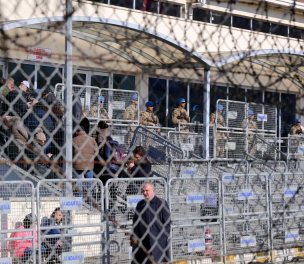* Photo: bianet
Click to read the article in Turkish
Taken into custody shortly after the court ruled for his acquittal and release in Gezi trial yesterday (February 18), Osman Kavala is expected to be referred to the prosecutor's office today as part of the investigation launched against him relation with the failed coup attempt on July 15, 2016.
Following the detention warrant of the İstanbul Chief Public Prosecutor's Office, Kavala was taken from Silivri Prison to the İstanbul Security Directorate. Kavala is currently held in the Anti-Terror Branch there.
Kavala is expected to be referred to the prosecutor's office at the İstanbul Courthouse in Çağlayan within his 24-hour detention period.
In the sixth and final hearing of Gezi trial yesterday, the İstanbul 30th Heavy Penal Court has ruled that Osman Kavala, the only arrested defendant of the case, shall be acquitted and released. Shortly afterwards, the İstanbul Chief Public Prosecutor's Office issued a detention warrant against him as part of an investigation launched into the coup attempt on July 15, 2016. Kavala is facing the possible charge of "attempting to disrupt the Constitutional order" as per the Article 309 of the Turkish Penal Code (TCK).
Osman Kavala was behind bars for 840 days.
ECtHR: Evidence was insufficient to justify suspicion
The European Court of Human Rights (ECtHR) concluded the application of Osman Kavala on December 10, 2019 and gave a ruling of "right violation" and "immediate release". The verdict of the court also referred to the investigation in question, indicating that "the evidence in the case file was insufficient to justify that suspicion."
CLICK - ECtHR Ruling on Osman Kavala: His Pre-Trial Detention Not Based on Reasonable Suspicion
The ECtHR made the following remarks in its verdict on Kavala:
"With regard to the accusations concerning the attempted coup of 15 July 2016, the Court noted that these were predominantly based on the existence of "intensive contacts" between the applicant and a certain H.J.B., who was the subject of a criminal investigation for involvement in organising an attempted coup. In the Court's view, however, the evidence in the case file was insufficient to justify that suspicion.
"In conclusion, the Court considered that the evidence submitted to it was insufficient to support the finding that there had been a reasonable suspicion against the applicant at the time of his initial detention.
"Furthermore, it had not been shown that the evidence added to the case file following the applicant's arrest and throughout the period of his continued detention within the scope of this case had amounted to facts or information giving rise to a suspicion justifying the applicant's initial and continued detention. In consequence, the Court concluded that the authorities had been unable to demonstrate that the applicant's initial and continued pre-trial detention were justified by reasonable suspicions based on an objective assessment of the acts in question." (HA/SD)






alscdhjaıs.jpg)





-132.jpg)